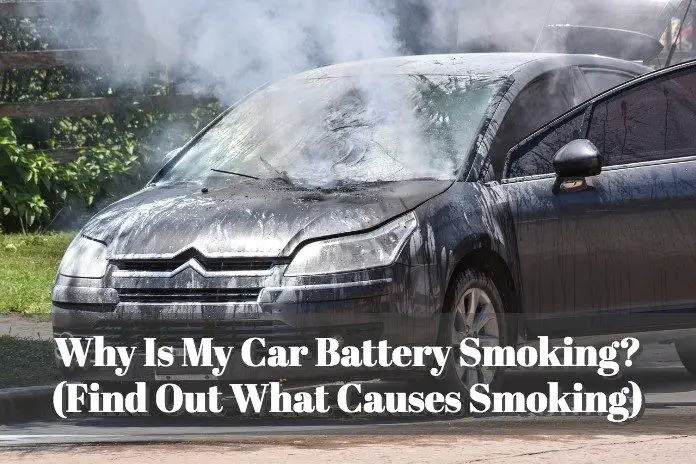
You’re just having your best morning. You just got out of the shower, and some hot coffee is waiting for you on the dining table. That’s a typical morning for most people. There is no good feeling than knowing you have important meetings or tasks to accomplish. However, all the joy may be stopped when you’re trying to drive out of the garage, and boom your car battery is smoking.
What causes car battery smoking? You may ask. A smoking battery may result from various complications surrounding the battery. They include:
• Excessive Heat
• Overcharging
• Faulty Alternator
• Dead Battery
• Poor Connection/Internal Shorting
For the first-timers, a smoking battery can cause havoc because you’re not sure where to begin. Also, you can’t ignore the fact that fault leads to delays, which means that you may have to miss an important meeting or work schedule. When it comes to a smoking battery, some people first hear a hissing sound before they see smoke coming off the hood. At times, smoking may be accompanied by a bad odor that smells like rotten eggs.
Whatever sign your note first, it’s important to note that it requires special attention. If you’re dealing with a maintenance-free battery, there is less you can do while it’s still smoking. But, if you are using a non-sealed version, you should start by opening the battery vents to allow the excess gases to escape.
When carrying out this activity, always wear protective gear because some batteries are usually a few minutes to exploding when they start smoking.
1. Overheating
Often, overheating is typically the root cause of smoking batteries. If you have been having trouble with a smoking battery, you may have noticed the experience that occurs during the hot climates or summertime. Well, you should know that you aren’t alone. Many people have reported their batteries exploding during the summer season.
What happens during the hot season is that the electrolyte is subjected to excessive heat. As a result, the liquid content may start to evaporate, and hence the smoking. If not monitored, the smoking can kill your battery in the next minute.
So, how can you deal with the excess heat?
The best way to curb excess heat is by investing in a battery model that is designed for the hot weather. Some batteries come with durable casing to help with the insulation, and this means that the electrolyte won’t be affected by the boiling temperature. Also, you can install some insulators around the battery compartment to help keep the heat at bay.
2. Overcharging
Did you experience a smoking battery after a night of charging? Well, if that’s the case, the smoke may be an indication that your battery as overcharged. The cell responds by releasing the excess pressure, which comes out in the form of smoke. Cases of overcharging are common and can kill the battery if not appropriately monitored.
When dealing with the smoking caused by overcharging, because the gas being released is usually toxic and highly flammable, the flammability is what have caused explosions on many batteries. If you’re a victim of battery overcharging, you need to ask yourself a lot of questions. Professionals always insist that individuals should desist from using the standard battery chargers.
What’s the difference between a typical charger and a smart one? When it comes to using the standard chargers, they are hard to monitor. All they do is pumping the current into your battery as long as they are connected to the battery. They don’t consider the battery’s state of charge as it’s with smart chargers.
You must know that it doesn’t take long for even a 50Ah charger to overcharge your 50Ah battery. Therefore, when shopping for a charger, it’s recommended that you go for one that is microprocessor-controlled. Although these types of cells come at a higher price tag, they are worth saving your battery.
3. Faulty Alternator
Today’s cars are designed to charge the battery while there are on the move. It’s the alternator that performs all this work. It’s for this reason that you don’t need to use your battery charger every morning. However, alternators are prone to breaking down. A smoking battery is one of the significant signs indicating that the battery is at stake.
The faulty alternator can lead to overcharging. From a professional’s perspective, a typical alternator should have a range of between 13.7 – 14.7 volts. Therefore, you can measure the voltage to be sure that the alternator has an issue. The best way to deal with a faulty alternator is to call in for professional assistance. Your mechanic will most likely tell you to switch off the car, open the battery vents, and wait for them to arrive.
4. Dead Battery
Yes, the smoke you see coming from the battery may be an indication that the battery is past its lifespan. If you wake up to a smoking battery, the first thing you should ask yourself is the age of the battery. If you can’t even recall when the battery was bought, then it’s an indication that you need to start your shopping for the next replacement.
How can a dead battery start a car?
This is one question that most drivers, those who don’t want to accept reality, ask? You should know that on such an instance, the battery may have used its very last ghost to ignite the engine. Therefore, if you have been having similar problems with the battery, the suitable option should be to get a new one before things get worse.
5. Lose Connection/Internal Shorting
The battery of your car is a susceptible component. Remember, you are dealing with electric current here. Therefore, a slight glitch can mean much harm to the battery. You are always advised to ensure that the terminals of your battery are tightly screwed. Tightening those screws ensures that the battery won’t experience some sought of shorting, which may end up killing the battery.
If you notice a smoking battery, it may be a sign that the positive plate may have come into contact with the negative one. Therefore, you should start by checking for the origin of the short-circuiting before you decide to replace the battery.





